- Blog
- Goop Marketing Breakdown: How They Turned Content and Controversy Into a Cult Brand
Goop Marketing Breakdown: How They Turned Content and Controversy Into a Cult Brand
Table of Contents
Let’s be honest—most brands would kill for Gwyneth Paltrow’s level of influence. She’s got star power, a fiercely loyal fan base, and the uncanny ability to sell jade eggs for $66 without so much as a raised eyebrow. But Goop didn’t get here by accident.
This is the result of a carefully crafted marketing machine—one that fuses aspirational content, high-end product curation, and just the right amount of headline-making controversy.
So how exactly did Goop pull it off? Let’s break it down.
1. Use premium pricing as a signal
Goop’s product catalog isn’t just a random assortment of wellness goods—it’s a meticulously curated collection that radiates luxury, intention, and exclusivity.
From $125 facial serums to $300 crystal sets, the brand seamlessly blends its own Goop label with handpicked products from over 50 independent makers.
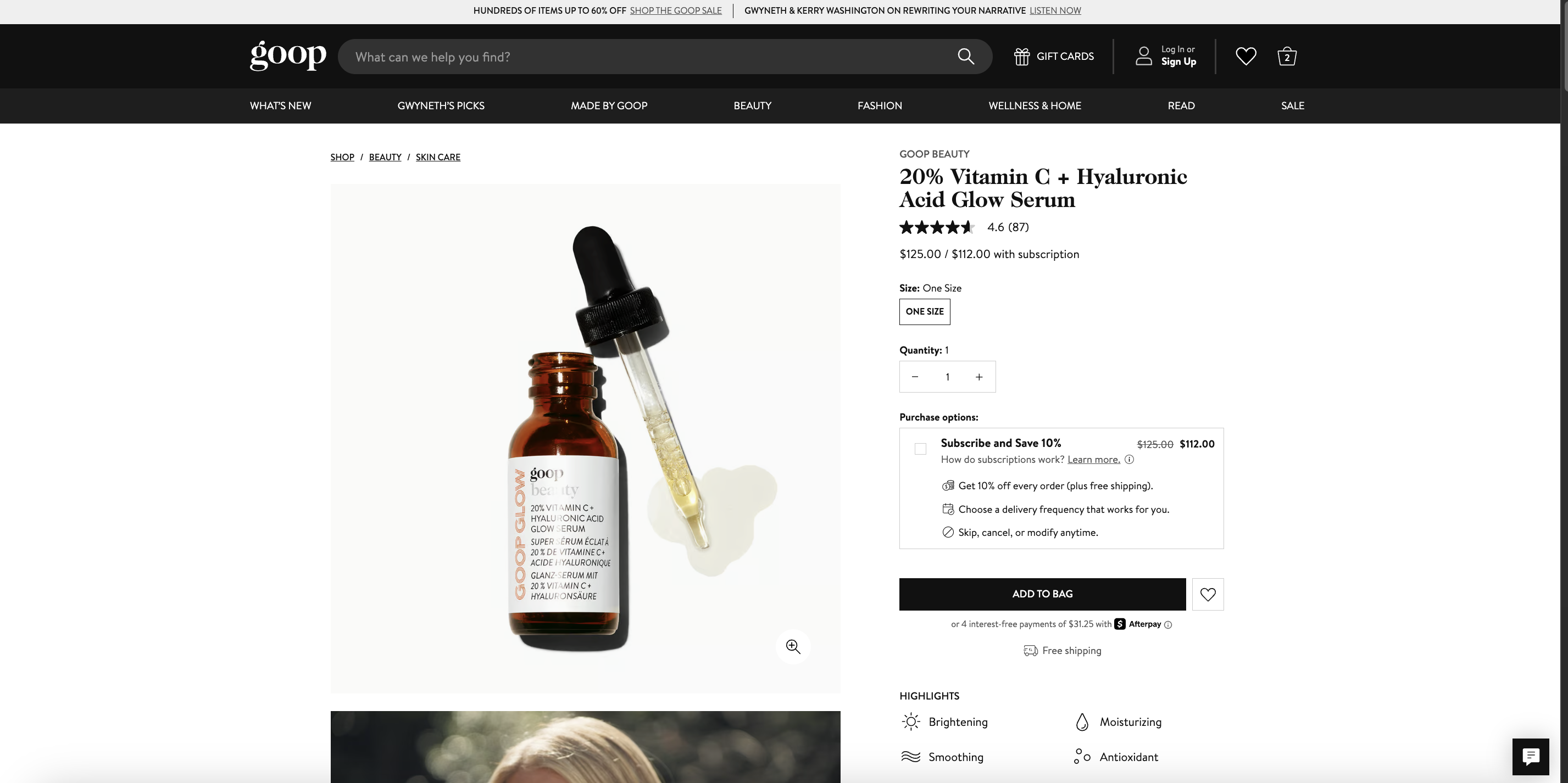
But the high price tags aren’t just for show.
Goop knows its audience: affluent, wellness-obsessed consumers who see premium pricing as a signal of purity, ethics, and elevated taste.
With minimalist design, clean ingredients, and a “you won’t find this anywhere else” approach, Goop transforms shopping into a lifestyle statement—turning customers into loyal followers of the brand’s high-vibe philosophy.
2. Build a brand empire starting with your blog
Goop didn’t lead with products—it led with content. What began as a weekly wellness newsletter quickly grew into a full-scale digital media hub, publishing everything from clean beauty tutorials to hormone health explainers.
Content remains central to Goop’s strategy, attracting over 3 million monthly visitors and fueling its estimated $100 million in annual revenue.
Each article is crafted to educate and convert. Whether it’s a skincare routine or an adaptogen guide, the content subtly integrates shoppable links—making a purchase feel like the natural next step.
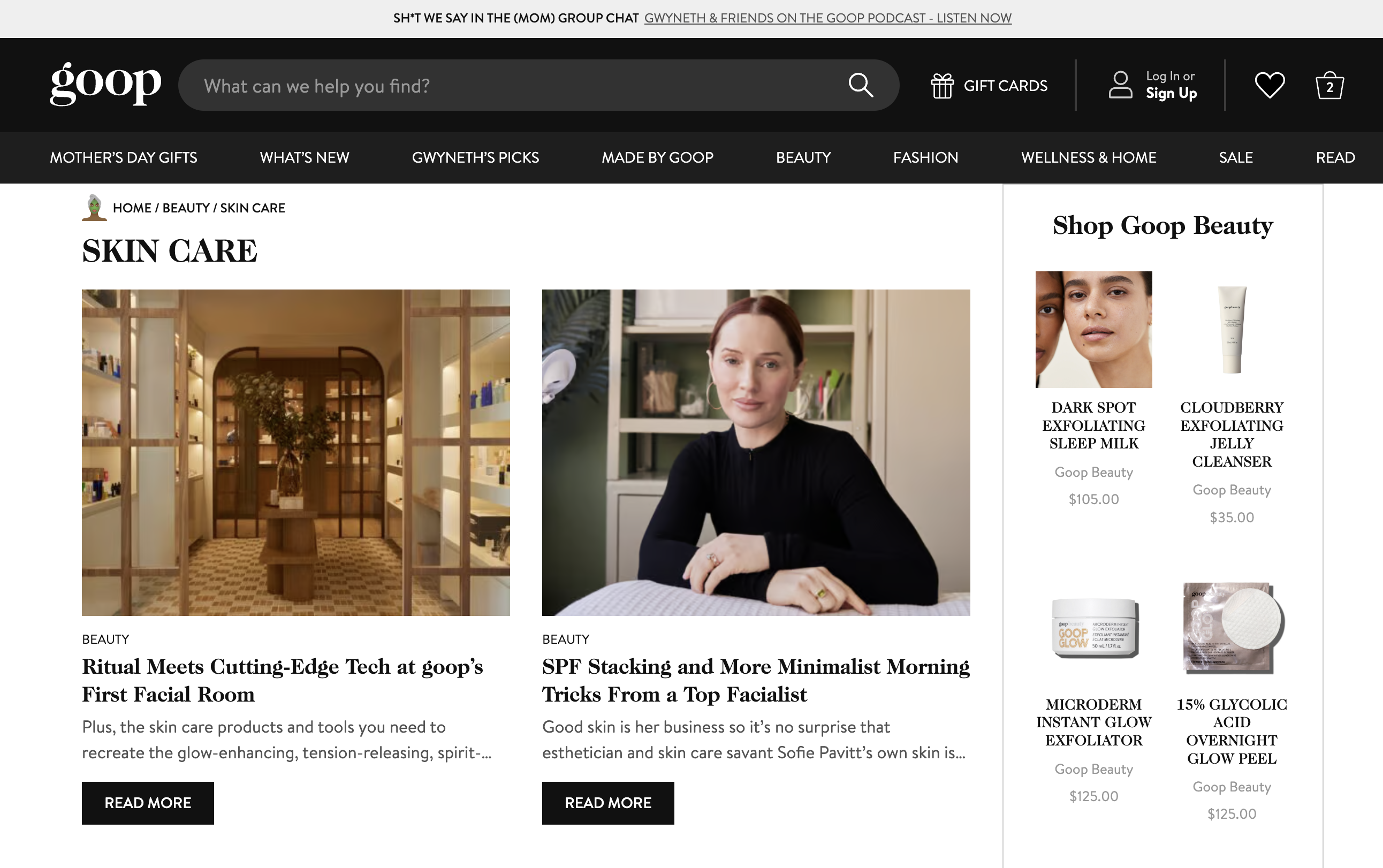
This editorial approach extends beyond the website. “The goop Podcast”, hosted by Gwyneth Paltrow and her team, features conversations on wellness, relationships, and culture, deepening audience engagement and reinforcing brand authority.
By prioritizing value and trust, Goop turns content into a conversion engine. It’s part magazine, part storefront, and solid proof that thoughtful storytelling still sells.
3. Boost your brand by partnering with trusted influencers
Gwyneth Paltrow isn’t just Goop’s founder—she’s its living brand identity. Her lifestyle choices, wellness philosophies, and unapologetic authenticity drive media buzz, consumer trust, and purchase intent. But let’s not ignore the elephant in the jade egg: controversy is part of the package—and the strategy.
From eyebrow-raising wellness claims to headlines that spark FDA scrutiny, Paltrow’s bold persona fuels Goop’s cultural relevance.
Beyond Gwyneth, Goop also leverages a curated network of influencers and affiliates who reflect the brand’s clean, elevated aesthetic.
Through its performance-based affiliate program, creators earn commissions by authentically promoting Goop products across their platforms.
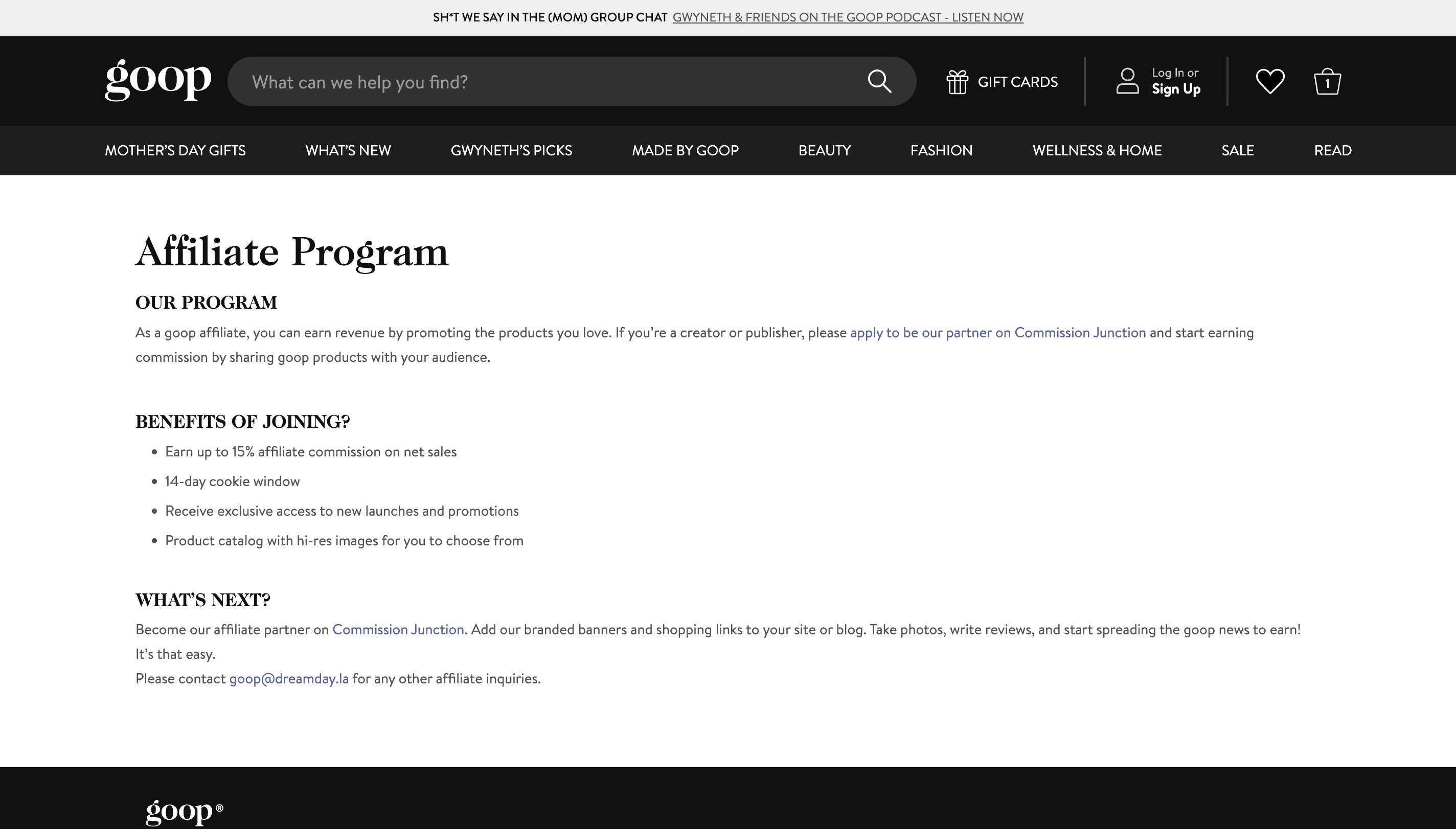
This selective, values-driven strategy ensures consistency, credibility, and wide reach—turning influencer content into a scalable, trust-driven sales engine without compromising the brand’s identity.
4. Drive action with “almost gone” messaging
Much like a luxury fashion label, the brand releases products in limited quantities, often through exclusive collaborations or seasonal drops. These time-sensitive launches are designed to feel rare, coveted, and just out of reach.
Many of these items are marked clearly as “Final Sale” on the product page, signaling to customers that once they’re gone, they won’t be restocked (or refunded).
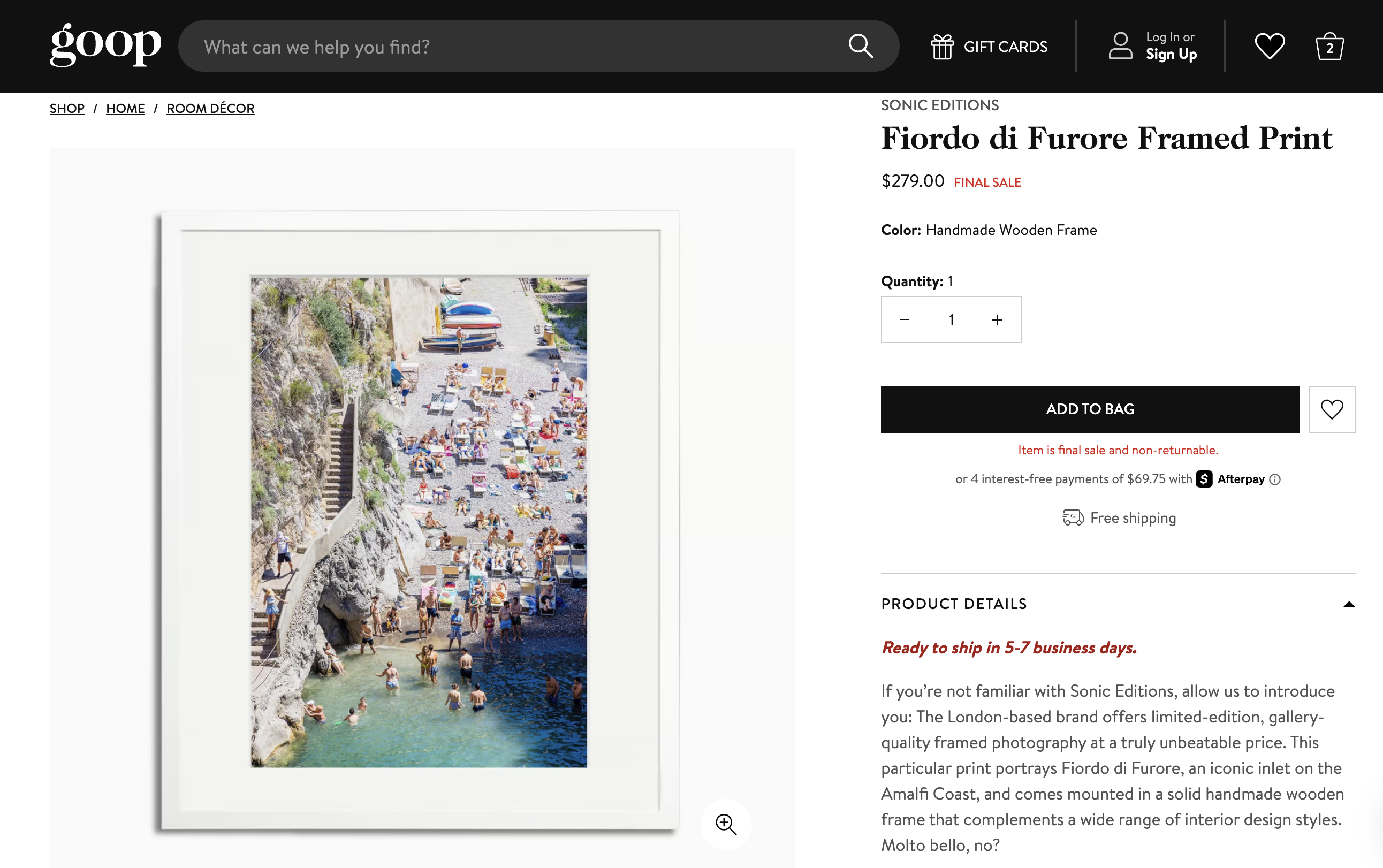
The psychology is simple: scarcity creates perceived value. When shoppers see that inventory is limited and final, they’re more likely to act fast—and take pride in owning something few others can.
This tactic doesn’t just build hype. It drives traffic, boosts conversions, and encourages loyal customers to check back often for the next release.
5. Grow faster with a multi-channel marketing strategy
With storytelling at its core, Goop has built a multi-channel strategy that transforms content into commerce across every digital touchpoint.
On Instagram, Goop blends polished visuals, curated product features, and the occasional Gwyneth Paltrow cameo to maintain a strong 1.9% engagement rate.
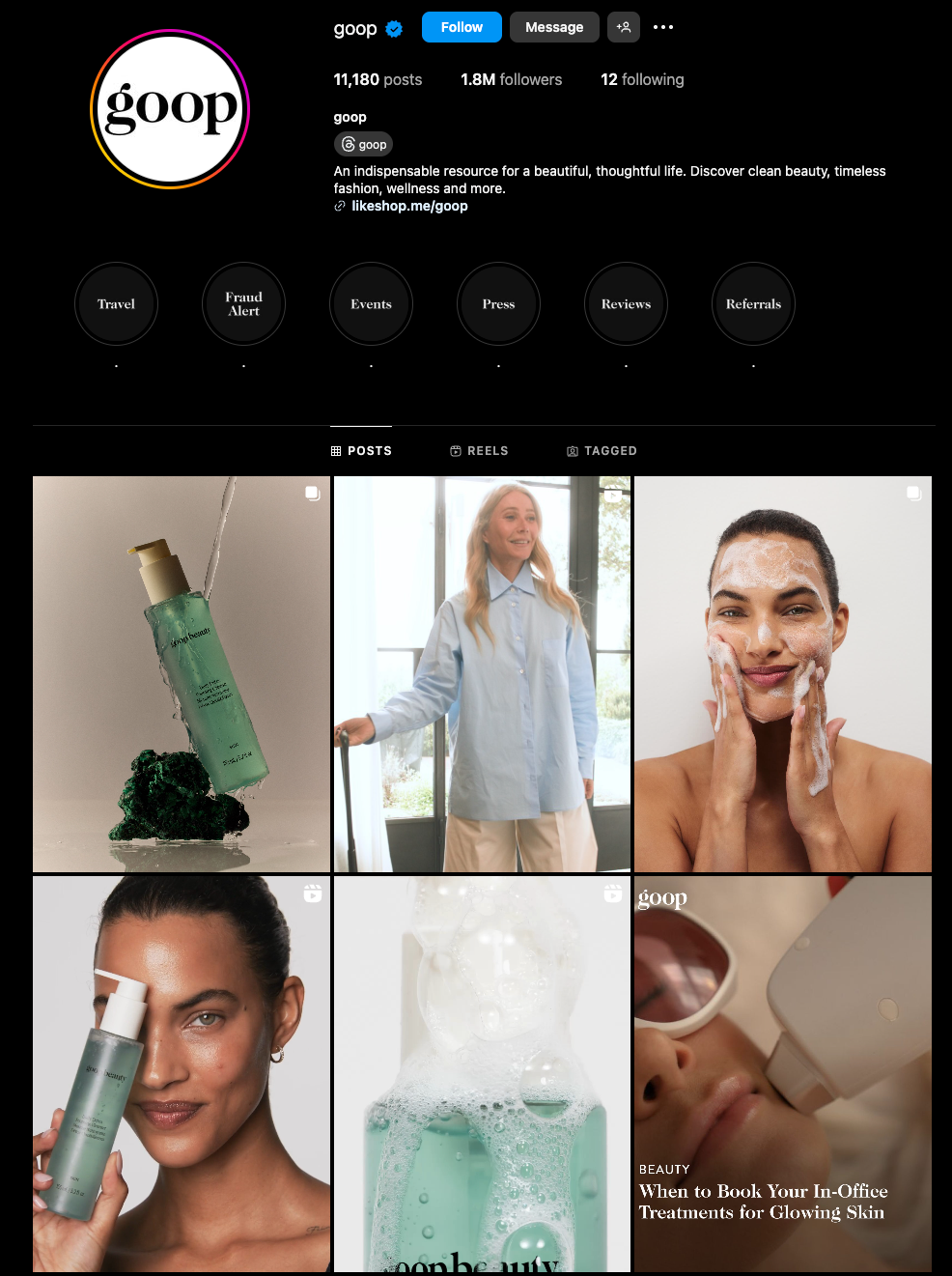
They leverage TikTok to engage a younger, wellness-curious demographic with behind-the-scenes content, trending audio, and bite-sized beauty tips—growing the account to over 186K followers and millions of likes.
@goop Day in the life with goop social! #goop ♬ French House - Dmitriy
Email newsletters remain a cornerstone of Goop’s digital strategy, not just as its origin but as a high-performing channel in its own right. With open rates exceeding 20% and a subscriber base nearing 1 million, Goop uses email to announce product launches, share curated wellness picks, and drive traffic directly to product pages.
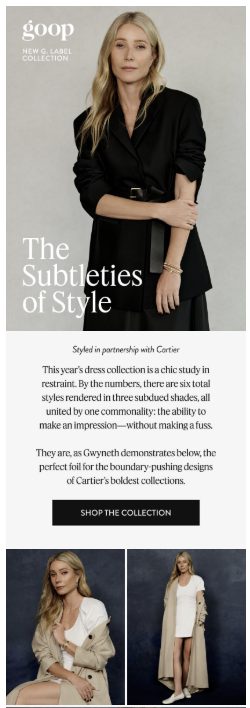
The brand also maintains a consistent presence on Pinterest, Facebook, and Twitter, repurposing content for discovery.
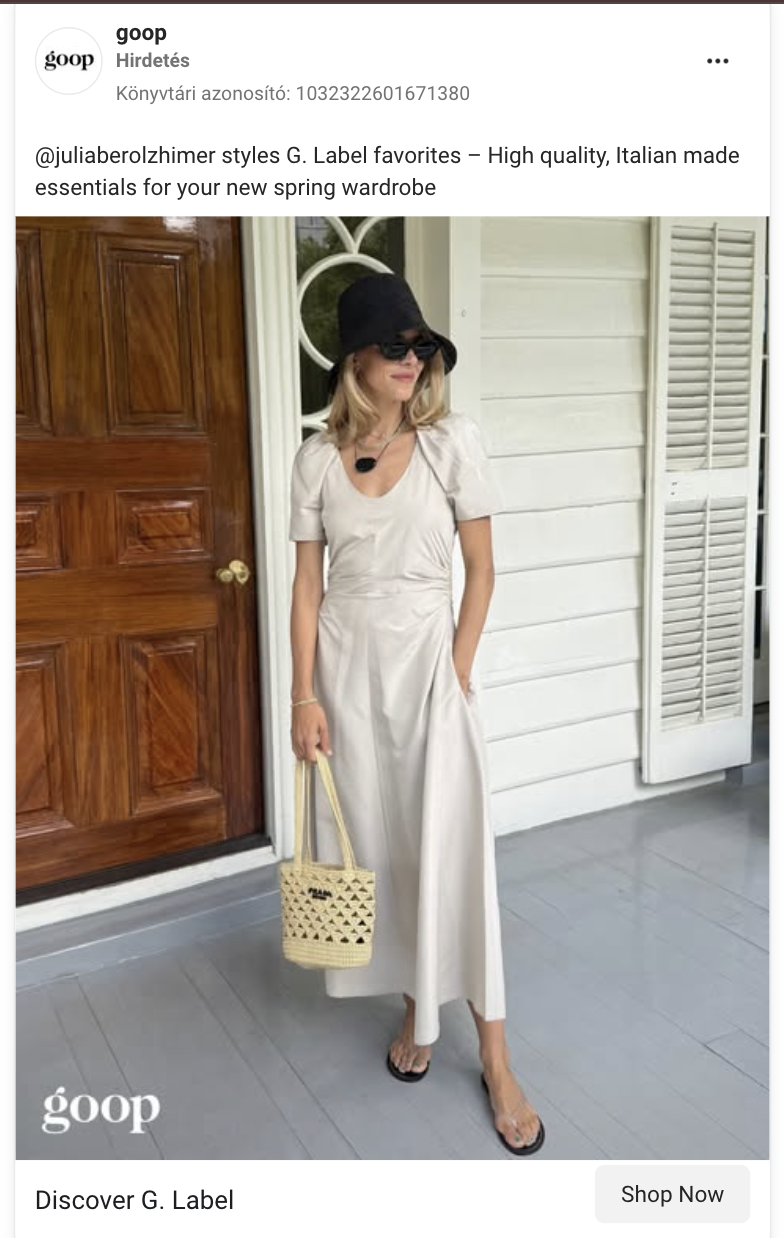
6. Build deeper connections through purposeful events
Goop brings its brand offline with wellness summits, fireside chats, and intimate panels that feel exclusive, high-vibe, and deeply personal.
Their flagship event, “In goop Health”, is a fully immersive wellness experience featuring expert-led talks, healing workshops, sound baths, and a curated Goop marketplace. It’s less a conference, more a luxury retreat for the wellness-obsessed.
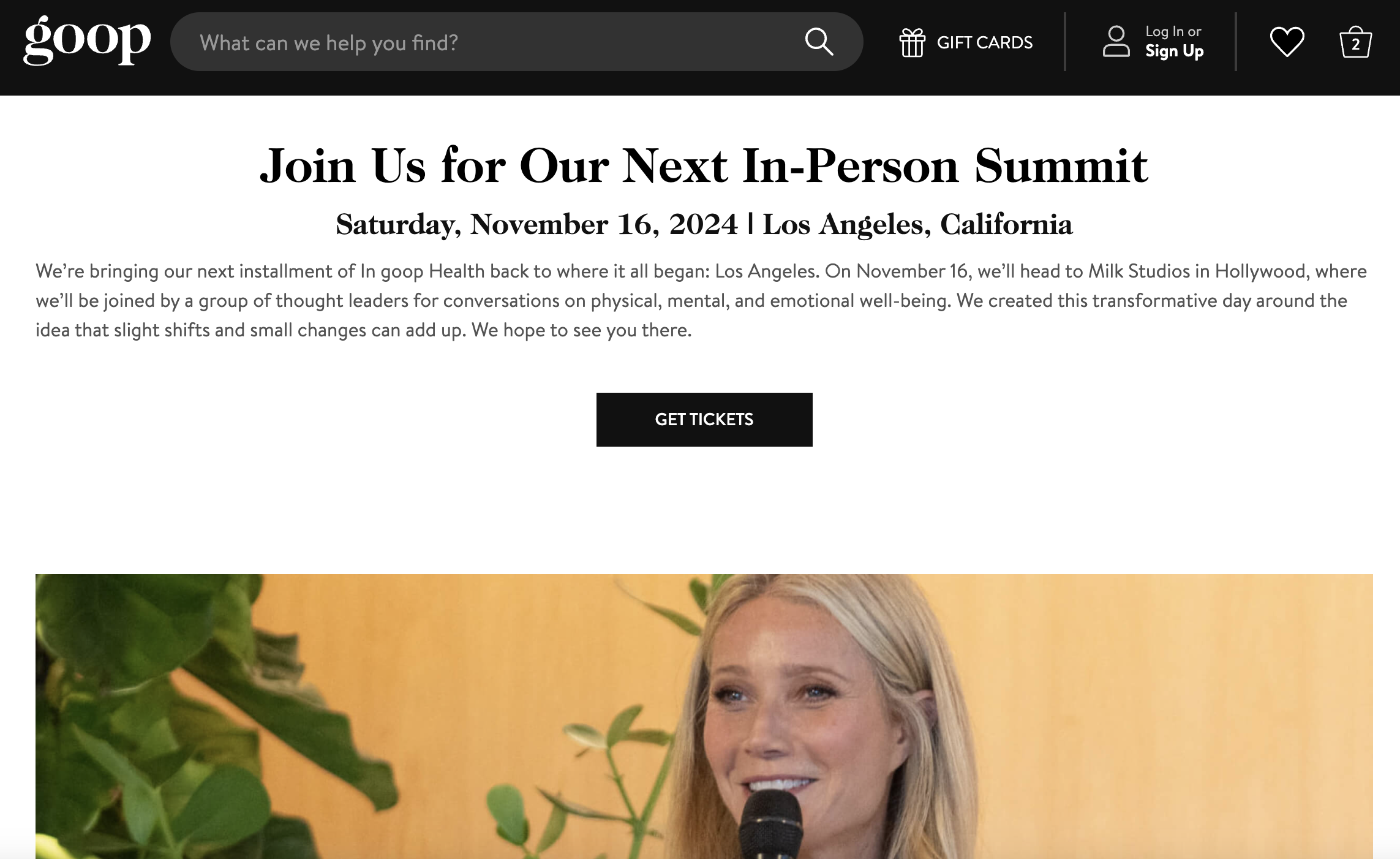
These events generate millions in revenue, but more importantly, they build loyalty. Attendees don’t just shop the brand—they live it.
7. Optimize your back end for scalable growth
Behind Goop’s glossy visuals and luxe branding lies a finely tuned digital engine built for performance and scale. The website isn’t just beautiful—it’s carefully optimized to convert at every step.
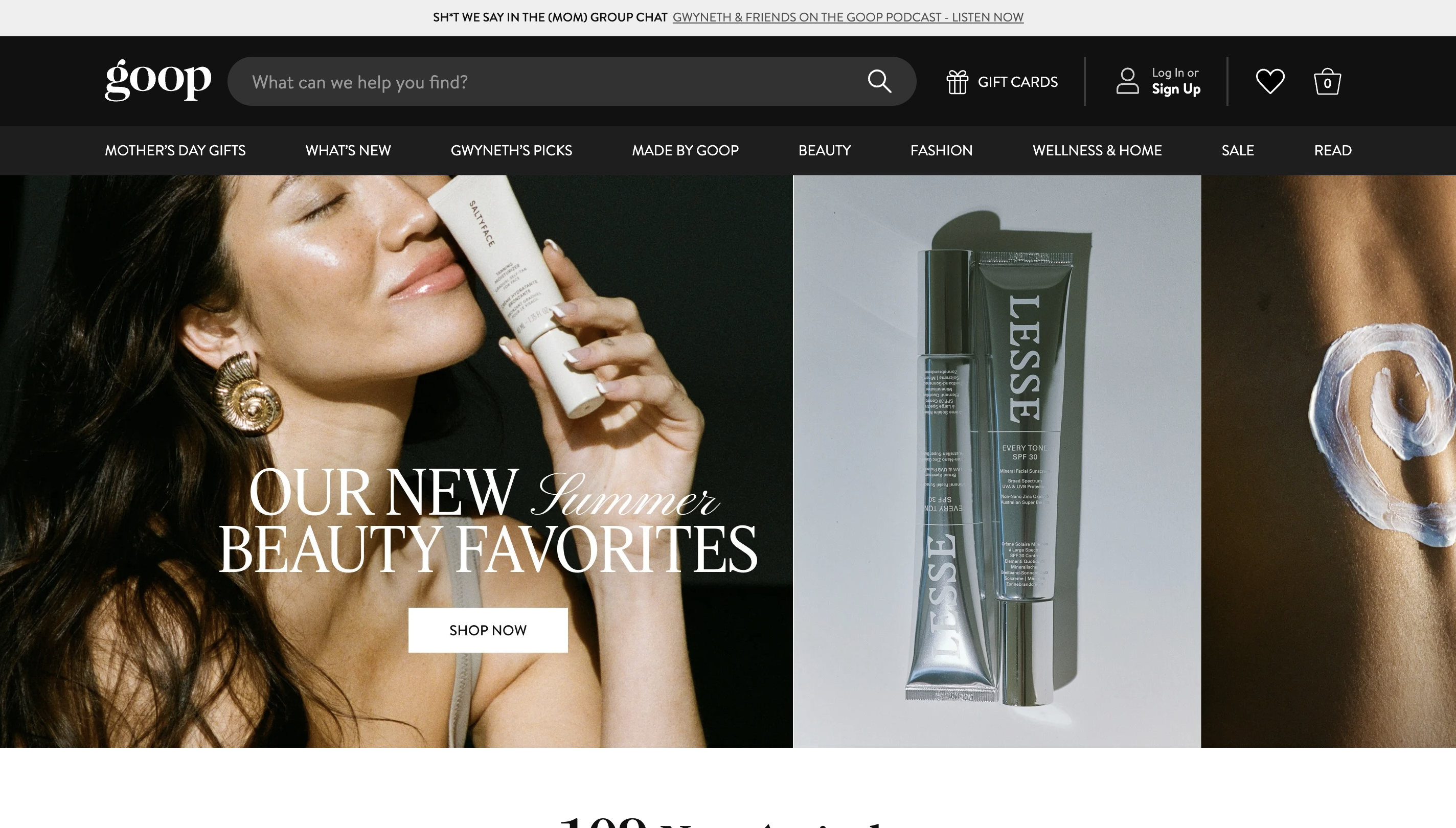
Goop’s product pages are a masterclass in CRO design. Take the 3X Retinol Eye Lift Serum, for example: it blends high-converting elements like customer reviews, before-and-after photos, and related product suggestions, all strategically placed to build trust, reduce hesitation, and encourage add-to-cart actions.
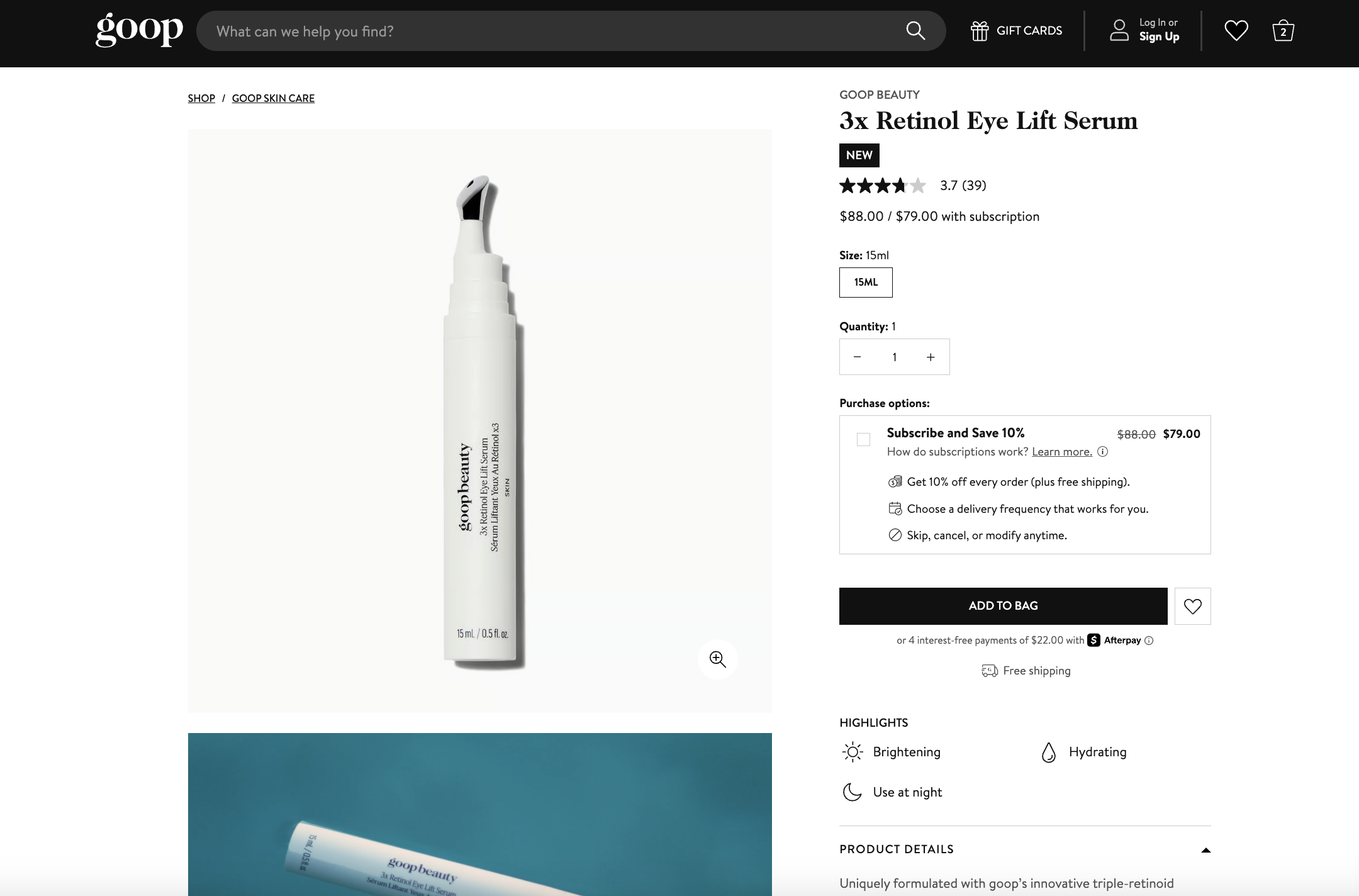
And the product guidance doesn’t stop there. As soon as an item is added to the cart, Goop continues recommending relevant products—even on the cart page itself—ensuring every step of the journey feels personalized, curated, and conversion-ready.
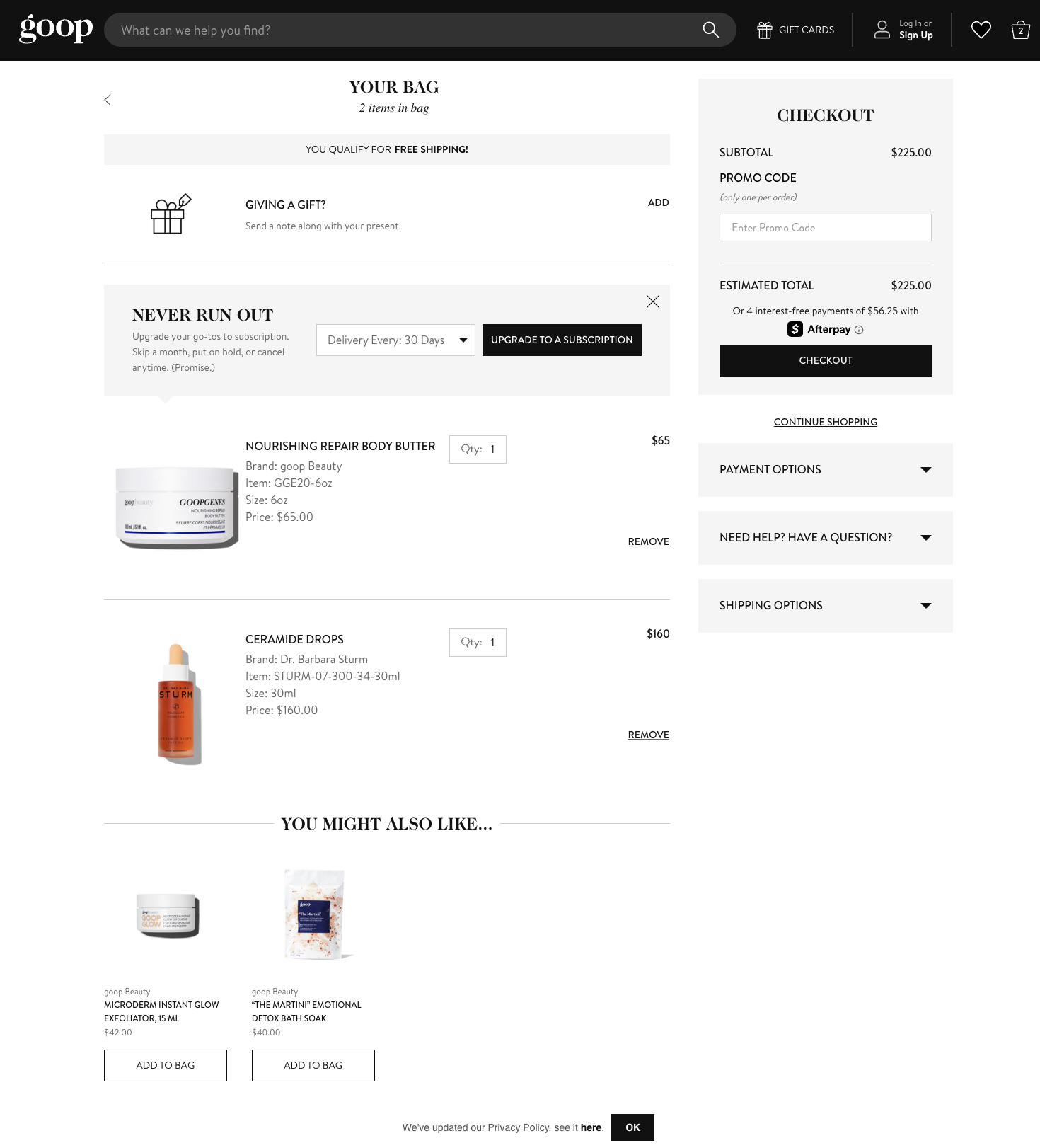
A standout part of Goop’s digital experience is its subscription system, designed for convenience, flexibility, and retention. Customers can choose delivery intervals of 30, 60, or 90 days, save 10%, and enjoy free shipping.
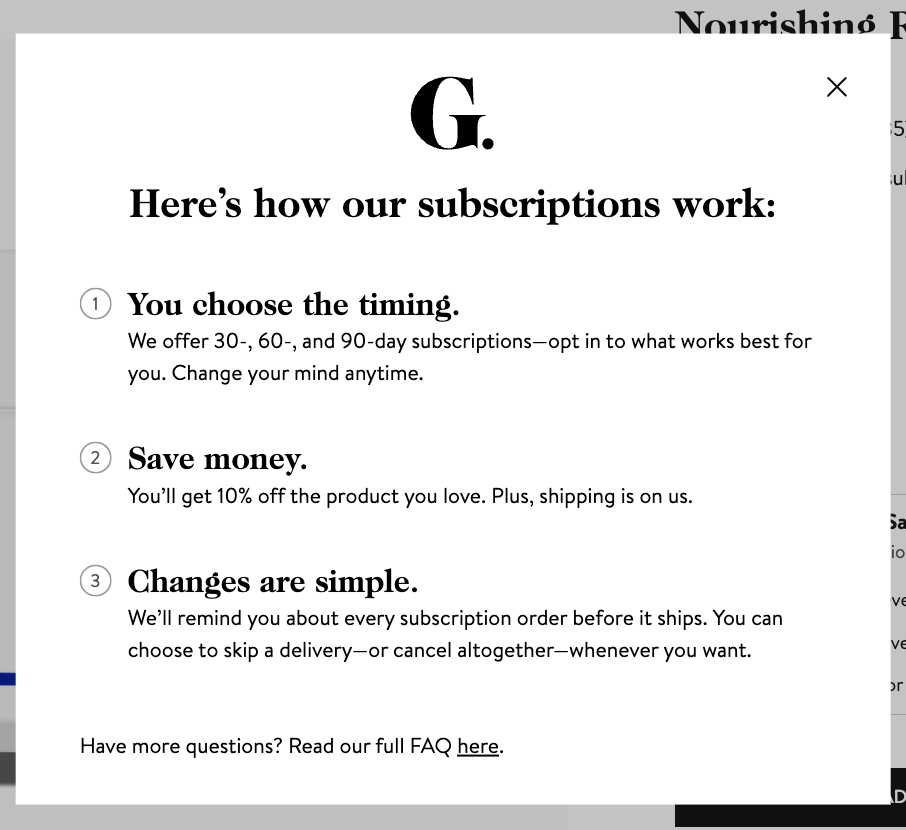
Goop also sends reminders before each shipment, allowing users to skip, modify, or cancel with no friction. It’s a user-first system that keeps loyal customers engaged and ensures consistent recurring revenue.
Takeaway
Goop isn’t just a wellness brand—it’s a cultural force. Through curated products, bold content, smart tech, and the unapologetic presence of Gwyneth Paltrow, it’s built a loyal, high-value audience and turned controversy into currency.
The strategy? Be intentional, be aspirational, and don’t be afraid to start a conversation. Love it or not, Goop proves that a clear voice, strong values, and fearless marketing can build not just a business, but a brand people believe in.
Learn more
Looking for more marketing breakdowns? Check out these articles:
- Lemme Marketing Strategy: How Kourtney Kardashian Built a Supplement Brand That Went Viral
- KEEN Footwear’s Marketing Playbook: From Sandals to a Movement
- KHY by Kylie Jenner Marketing Breakdown: What’s Fueling the Hype & What’s Falling Apart
- SodaStream Marketing Breakdown: Sustainability, Partnerships & Bold Campaigns
- The Sill Marketing Breakdown: How They Grew into a Leading DTC Plant Brand
- Sol de Janeiro Marketing Breakdown: The Secret Behind Their Explosive Growth
Migration has never been easier
We made switching a no-brainer with our free, white-glove onboarding service so you can get started in the blink of an eye.
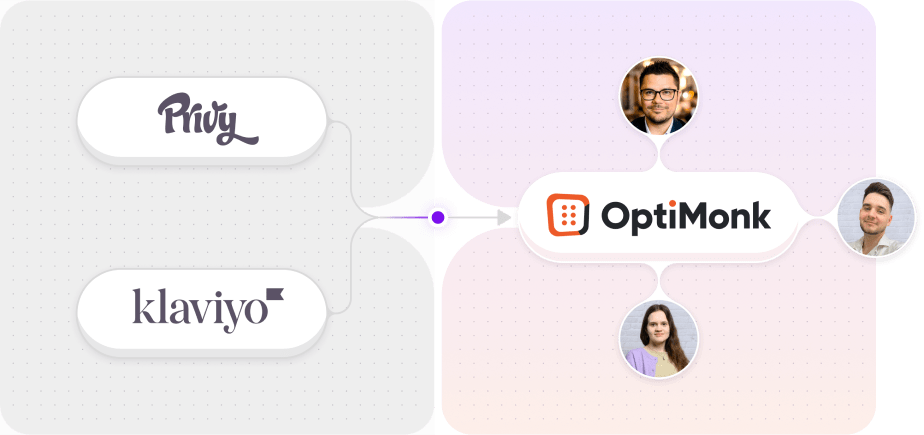
What should you do next?
Thanks for reading till the end. Here are 4 ways we can help you grow your business:
Boost conversions with proven use cases
Explore our Use Case Library, filled with actionable personalization examples and step-by-step guides to unlock your website's full potential. Check out Use Case Library
Create a free OptiMonk account
Create a free OptiMonk account and easily get started with popups and conversion rate optimization. Get OptiMonk free
Get advice from a CRO expert
Schedule a personalized discovery call with one of our experts to explore how OptiMonk can help you grow your business. Book a demo
Join our weekly newsletter
Real CRO insights & marketing tips. No fluff. Straight to your inbox. Subscribe now
- Posted in
- Marketing Breakdowns
Partner with us
- © OptiMonk. All rights reserved!
- Terms of Use
- Privacy Policy
- Cookie Policy













